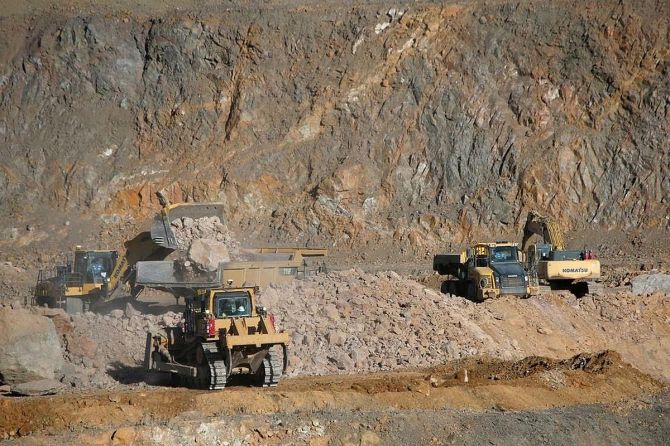Parliament has cleared the Mines and Minerals (Development and Regulation) Amendment Bill, 2023, recently.

The objective of the Act is to invite investments from the private sector, including foreign companies, for mining minerals such as lithium and other critical minerals.
Other than lithium, some of these minerals were classified as atomic minerals, including beryl and beryllium, niobium, titanium, tantalum and zirconium.
By odd coincidence this week, a Supreme Court-ordered trial court in Delhi highlighted another mining story, of coal, where the private sector has been involved.
Special Judge Sanjay Bansal convicted former coal secretary H C Gupta, former Lok Sabha MP Vijay Darda and businessman Manoj Kumar Jayaswal among others in different terms in jail, three to four years.
Not only are these cases related to mining, but they also have another unfortunate aspect.
The cases, like the one on Gupta and Darda, have run for nearly 10 years.
These developments present a stark reminder to the private sector about the risk of legal tangles associated with the mining sector in India.
This is particularly applicable to those areas of mining where the state has freed control, such as coal and iron ore, over the past three decades.
In coal mining, for instance, all activities were nationalised under the Coal Mines (Nationalisation) Act of 1973 and opened to the private sector 20 years later in 1993.
One of the reasons the myriad coal cases reached the courts is the absence of clear rules about how the private sector was to be involved.
If a company has to spend money to invest in a project, it must have a clear vision of the revenue it will earn.
But successive governments since 1991 found it difficult to amend the Coal Act and instead wrote in ad hoc rules to allow private companies to mine and sell the mineral in the market.
For example, companies were told they could mine coal but only for captive use. Since they could not sell in the markets despite shortages this was an arbitrage waiting to be exploited.
While coal was a demonstration case of how not to denationalise an industry, the relaxation of iron ore mining rules also ran into trouble.
Many companies involved themselves with trading the ore, including for exports, without clear authorisation, causing the Centre to impose outright bans on these activities.
Some groundwork has been done with the amendment of the Mines and Minerals (Development and Regulation) Amendment Bill, 2023.
The amended law declassifies not only the six atomic minerals but also puts out a list of 29 minerals including gold, silver, copper, cobalt, nickel, lead, potash, and rock phosphate.
Before this, the prospecting and mining of atomic minerals were reserved for government entities under the Act, and the mining of the other minerals too was restricted.
It also helps that the current secretary, mines, Vivek Bharadwaj, was the court-appointed nominated authority for the coal sector. His job was to hand out authorisation to companies to mine coal after having satisfied himself that they had won the rights to do so through an auction process approved in 2016.
The process offered him a valuable lesson in how short-circuiting the legal process of opening the mining rights to a mineral could have such disastrous consequences for the economy.
Commenting on the passage of the Bill by Lok Sabha, Rakesh Surana, partner, Deloitte India, said: “The anticipated surge in mining activities will undeniably propel India towards sustainable progress and resource self-reliance.”
The euphoria may have to be tempered as of now.
These, as we have said, are difficult areas though the government seems to have learnt its lessons.
The provisions note that all the allocations will be done by the auction route.
This is a valuable lesson drilled in as an after-effect of the coal scam.
The courts have also supported this method.
“The exploration licence will be granted by the state government through competitive bidding.
"The central government will prescribe details such as manner of auction, terms and conditions, and bidding parameters for exploration licence through rules,” said a commentary on the provision of the bill put out by PRS Legislative Research.
The step is useful since some of the most egregious violations of the mining rights have happened at the level of state governments.
For lease of minor mines such as sand, states have frequently given out the rights for free.
The new law, thus, treads a fine balance between the Centre’s tendency to ascribe to itself most of the powers and the rights of the state to get a fair share of the revenue from the mining.
“If the resources are proven after exploration, the state government must conduct an auction for mining lease within six months of the submission of the report by the exploration licensee.
"The licensee will receive a share in the auction value of the mining lease for the mineral prospected by them.
"The share will be prescribed by the central government.
"If the state government does not complete the auction of mining lease within the specified period, it will pay to the exploration licensee an amount prescribed by the central government,” the PRS note adds.
The Centre will have the rights to hold auctions for composite licence and mining lease for only a few specified critical and strategic minerals.
These minerals include lithium, cobalt, nickel, phosphate, potash, tin, phosphate and potash. However, concessions to actually mine the site by the company will still be granted by the state government.
The risks are obvious.
The states have had very limited exposure to auction the mining rights.
This is significant since the critical minerals are located in states that have been traditionally non-mining ones such as Jammu and Kashmir.
Yet whenever a new site or area is identified by the Geological Survey of India, the states will have to conduct two rounds of auctions, the first for an exploration licence and the next time to mine those.
Naturally, while it was a good idea to specify that the rights will be based on auctions, it shall be important to specify what sort of company would be allowed to participate in the auction.
Rules to specify a particular technology or a capital threshold can be used to screen competition.
Remember the quest for critical minerals is likely to be capital-intensive.
And then there are deep environmental concerns.
Regulatory capacity in this context counts.
“Appointment of regulators in India may have led to issues in regulatory capacity leading to compromised regulatory substance in terms of quality that hurts credibility,” K V Pratap, an IES officer wrote in Economic and Political Weekly (July 15, 2023) who has dealt extensively with infrastructure policy and finance in the Ministry of Finance.
India’s record of drawing in global mining companies is not good.
The race for extracting critical minerals, however, needs to improve on that patchy record.
Firm and transparent laws are key to attracting such investments.
Mine and matter
Bill introduces concept of exploration licence to authorise reconnaissance or prospecting
29 minerals under the ambit of Bill includes gold, silver, copper, cobalt, plus six minerals classified as atomic minerals like lithium
Exploration licence to be granted by state government through auctions but central government will prescribe details
Companies receive a share in the auction value of the mining lease for the mineral prospected by them. Share will be prescribed by central government
Auction for composite licence and mining lease of critical and strategic minerals like lithium, cobalt & nickel to be decided by the central government.<hr>
<p><strong><em>Disclaimer: This article is meant for information purposes only. This article and information do not constitute a distribution, an endorsement, an investment advice, an offer to buy or sell or the solicitation of an offer to buy or sell any securities/schemes or any other financial products/investment products mentioned in this article to influence the opinion or behaviour of the investors/recipients.</em></strong></p>
<p><strong><em>Any use of the information/any investment and investment related decisions of the investors/recipients are at their sole discretion and risk. Any advice herein is made on a general basis and does not take into account the specific investment objectives of the specific person or group of persons. Opinions expressed herein are subject to change without notice.</em></strong></p>












 © 2025
© 2025